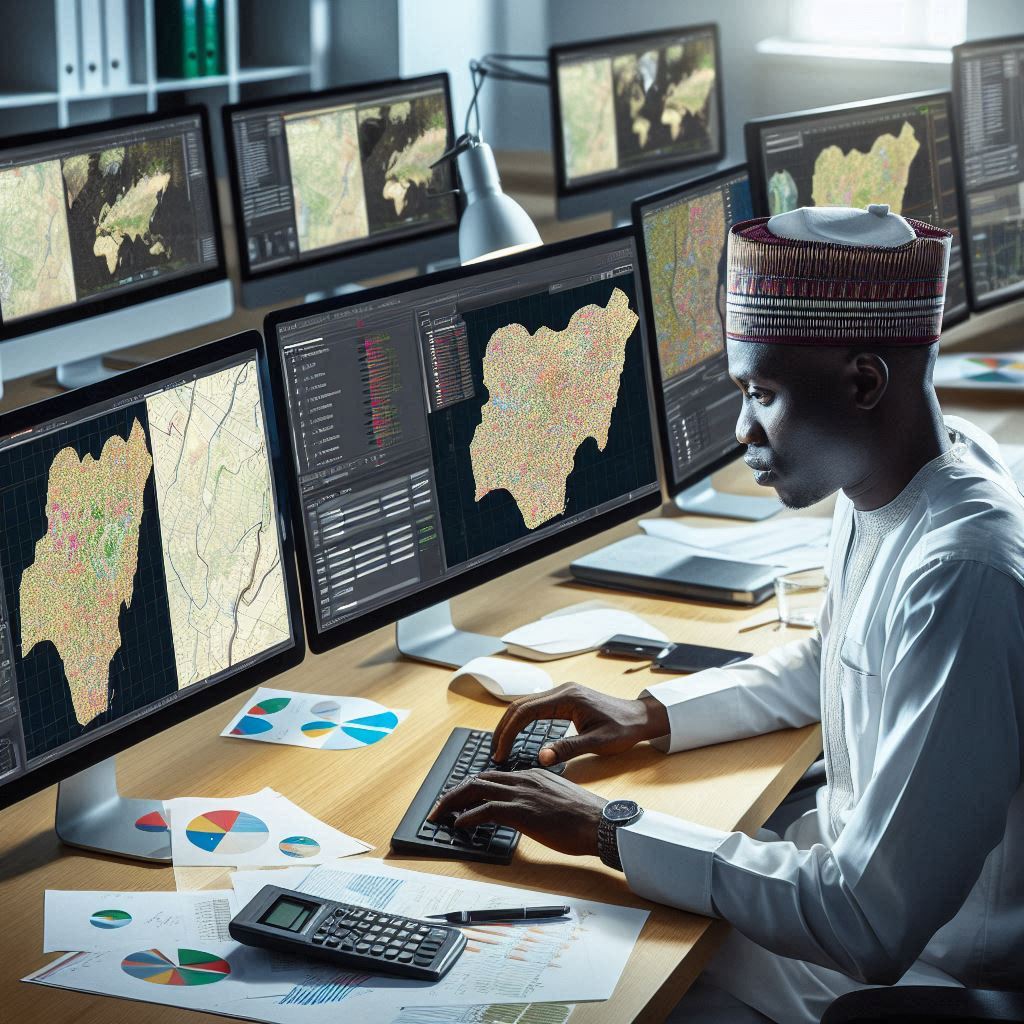Introduction
GIS (Geographic Information System) software plays a pivotal role in modern Nigeria, revolutionizing how geographical data is managed, analyzed, and utilized across various sectors.
Its importance cannot be overstated as it provides tools for mapping, spatial analysis, and decision-making based on location-specific data.
Understanding GIS Software
GIS software enables users to capture, store, manipulate, analyze, manage, and present spatial or geographic data. This technology integrates data from different sources, allowing for detailed mapping and insightful analysis.
In Nigeria, this capability is crucial for urban planning, environmental management, agriculture, and disaster response.
In Nigeria, GIS software helps tackle numerous challenges related to infrastructure development, resource management, and public health.
By visualizing data geographically, decision-makers can better understand spatial relationships and make informed choices that positively impact communities.
The use of GIS software is increasingly prevalent across various industries in Nigeria. In agriculture, for instance, it aids in precision farming, optimizing crop yields through soil analysis and climate data integration.
Similarly, in urban planning, GIS facilitates efficient land use mapping and infrastructure development planning.
Healthcare and GIS
GIS technology is also transforming healthcare delivery in Nigeria. By mapping disease outbreaks, healthcare providers can quickly respond to emergencies and allocate resources effectively.
Furthermore, GIS plays a crucial role in epidemiological studies and healthcare planning, ensuring equitable access to healthcare services.
Environmental conservation efforts benefit greatly from GIS software. Mapping biodiversity hotspots, monitoring deforestation, and analyzing climate change patterns are made possible through spatial analysis tools.
This data-driven approach supports sustainable development practices and informed policy-making.
In disaster management, GIS software enables proactive planning and rapid response. By mapping vulnerable areas and assessing risk factors, authorities can mitigate disasters and coordinate emergency responses more effectively.
This capability is crucial for reducing the impact of natural disasters in Nigeria.
As Nigeria continues to embrace GIS technology, its applications across industries expand, driving innovation and efficiency.
The ability to harness geographical data for informed decision-making empowers businesses, government agencies, and NGOs to address complex challenges and achieve sustainable development goals.
Future Outlook
Looking ahead, the future of GIS software in Nigeria appears promising. Advancements in technology will likely enhance data accuracy, processing speed, and accessibility, further extending its reach and impact.
Continued investment in GIS infrastructure and training will be essential to maximize its potential across diverse sectors.
Basically, GIS software is a transformative tool for Nigeria, enabling smarter decision-making and fostering sustainable development.
Its integration into various industries underscores its versatility and importance in shaping the country’s socio-economic landscape. As adoption grows, so too will its role in driving progress and innovation nationwide.
ArcGIS
ArcGIS, developed by Esri, stands as a cornerstone in Geographic Information System (GIS) software, renowned globally for its robust capabilities in spatial data analysis and visualization.
Features and Capabilities
ArcGIS offers a comprehensive suite of tools for mapping, spatial analysis, and data management. Users can create detailed maps, conduct spatial analyses, and integrate various data formats seamlessly.
Its intuitive interface allows both beginners and experts to harness its power effectively.
Applications in Nigeria
In Nigeria, ArcGIS finds widespread application across various sectors, from urban planning to natural resource management. Government agencies utilize it to map infrastructure, plan developments, and monitor environmental changes.
For instance, the Nigerian National Petroleum Corporation (NNPC) employs ArcGIS to manage and analyze oil exploration and production data, aiding in informed decision-making.
Case Studies
In Lagos, Nigeria’s bustling economic hub, ArcGIS plays a pivotal role in urban planning. Authorities use it to map population density, plan transportation routes, and manage land use effectively.
This technology assists in addressing infrastructure challenges and optimizing resource allocation in a rapidly growing city.
Benefits in the Nigerian Context
The benefits of ArcGIS in Nigeria are manifold. Firstly, it enhances decision-making by providing accurate spatial analysis, enabling policymakers to prioritize development projects effectively.
Secondly, it improves resource management through better understanding and utilization of geographical data.
For example, in agriculture, ArcGIS helps farmers optimize crop yields by analyzing soil composition and weather patterns.
Specific Advantages
ArcGIS offers specific advantages tailored to Nigeria’s needs. It supports disaster management by enabling authorities to create risk maps and plan evacuation routes.
During the 2012 flood disaster in Nigeria, ArcGIS facilitated emergency response efforts by providing real-time mapping of affected areas and coordinating relief efforts efficiently.
In summary, ArcGIS stands out as a powerful tool in Nigeria’s GIS landscape, empowering organizations and government agencies with the capability to harness geographical data for informed decision-making and sustainable development.
Its versatile features and proven applications across various sectors underscore its importance in shaping Nigeria’s future through effective spatial analysis and resource management.
Final Thoughts
As technology continues to evolve, ArcGIS remains at the forefront, adapting to meet the dynamic challenges of Nigeria’s growing urbanization and environmental management needs.
Embracing such advanced GIS solutions not only enhances operational efficiency but also fosters a more resilient and sustainable future for Nigeria.
By leveraging ArcGIS, Nigeria not only enhances its capacity for data-driven governance but also paves the way for innovative solutions to complex spatial challenges, ensuring a prosperous and well-managed future for its citizens.
Read: Challenges in Nigerian Curriculum Studies
QGIS
QGIS, or Quantum GIS, stands out as a versatile open-source geographic information system (GIS) software. It offers robust functionalities for spatial data analysis, mapping, and visualization.
Users appreciate its flexibility and the extensive array of plugins available, making it suitable for various applications.
Overview of QGIS Functionality
QGIS supports multiple data formats, including vector, raster, and database formats, enhancing its usability across different industries in Nigeria.
It allows users to create, edit, visualize, and analyze spatial data effectively. The software’s intuitive interface facilitates ease of use, enabling both beginners and advanced users to harness its capabilities efficiently.
Comparing QGIS with Other GIS Software Options
In Nigeria, QGIS competes with commercial GIS software like ArcGIS by Esri and MapInfo. While these proprietary solutions offer advanced features and support, they often come with significant costs.
QGIS, on the other hand, provides comparable functionalities without the financial burden, making it particularly attractive for academic institutions, NGOs, and small businesses in Nigeria.
Popularity and User-Friendliness of QGIS in Nigeria
QGIS has gained popularity across Nigeria due to its cost-effectiveness and community-driven development model. The availability of local language support and extensive documentation in English further enhances its accessibility.
Users appreciate the active community that contributes to continuous improvement and the frequent updates that address user feedback and technological advancements.
Practical Applications in Nigeria
In Nigerian sectors such as agriculture, urban planning, environmental management, and public health, QGIS plays a vital role.
Its ability to handle diverse geospatial data sets allows organizations to make informed decisions and implement effective strategies.
Government agencies utilize QGIS for land administration, infrastructure development, and disaster management, leveraging its geoprocessing tools and spatial analysis capabilities.
Training and Support Ecosystem
Training programs and workshops on QGIS are increasingly available in Nigeria, empowering more users to harness its full potential.
Online forums and local user groups provide platforms for knowledge sharing and troubleshooting, ensuring that users can overcome challenges effectively.
This support ecosystem fosters a collaborative environment where GIS professionals and enthusiasts can exchange ideas and best practices.
In a nutshell, QGIS stands as a testament to the power of open-source GIS software in Nigeria. Its functionality, cost-effectiveness, and community support make it a preferred choice for a wide range of users, from students to professionals in various sectors.
As the GIS landscape continues to evolve, QGIS remains poised to meet the diverse geospatial needs of Nigeria, driving innovation and informed decision-making across the nation.
Read: Role of GIS in Nigerian Urban Planning
GeoQlik
GeoQlik stands out in the Nigerian market as a robust Geographic Information System (GIS) software, offering unique functionalities tailored to local needs.
Unique Features of GeoQlik
GeoQlik integrates seamlessly with Qlik, a powerful business intelligence platform, enhancing GIS capabilities through intuitive mapping and visualization tools. Its interactive dashboards allow users to analyze spatial data effortlessly.
Uses of GeoQlik in a Nigerian Setting
In Nigeria, GeoQlik is pivotal in urban planning, infrastructure development, and natural resource management. Its geospatial analytics aid in identifying optimal locations for new projects and assessing environmental impacts.
Specific Projects and Applications in Nigeria
One notable application of GeoQlik is in urban transportation planning in Lagos. The software enables planners to simulate traffic patterns, optimize bus routes, and plan for future expansions based on demographic trends.
Advantages of GeoQlik Over Other GIS Software
GeoQlik offers distinct advantages over traditional GIS software. Firstly, its integration with Qlik allows for real-time data analysis and decision-making.
Secondly, the software’s user-friendly interface reduces training time and enhances productivity among diverse user groups.
Case Study: GeoQlik in Environmental Monitoring
In Nigeria’s oil-rich Niger Delta region, GeoQlik is utilized for environmental monitoring and disaster response.
The software’s spatial analysis capabilities assist in tracking oil spills, assessing damage to ecosystems, and facilitating rapid response efforts.
Choosing GeoQlik for GIS Needs in Nigeria
Choosing GeoQlik for GIS needs in Nigeria provides organizations and government agencies with a powerful toolset for spatial analysis, decision support, and data-driven planning.
Its integration with Qlik ensures that GIS becomes an integral part of broader business intelligence strategies, enhancing overall operational efficiency.
Future Prospects
Looking forward, the adoption of GeoQlik is expected to grow in Nigeria as industries recognize the value of geospatial data in improving efficiency, reducing costs, and mitigating risks.
The software’s adaptability to local contexts and robust analytical capabilities position it as a preferred choice in the evolving landscape of GIS technology.
In short, GeoQlik represents a significant advancement in GIS software within the Nigerian context, offering features that cater specifically to the complexities and challenges of the region’s diverse industries and environmental conditions.
Its ability to integrate with business intelligence systems makes it not just a mapping tool but a strategic asset for informed decision-making and sustainable development.
Read: Impact of GIS on Nigerian Environment

Global Mapper
Global Mapper is a versatile GIS software widely used in Nigeria for its robust features and user-friendly interface.
It offers a comprehensive suite of tools for spatial data analysis, visualization, and management, making it a preferred choice among GIS professionals and organizations in the country.
Key Features and Capabilities
Global Mapper excels in its ability to handle various geospatial data formats seamlessly. It supports raster, vector, and elevation data, allowing users to import, export, and manipulate data from different sources.
The software’s intuitive interface simplifies complex GIS tasks such as terrain modeling, 3D rendering, and LiDAR processing.
Transform Your Career with Expert Guidance
Get personalized mentorship consulting that’s tailored to your unique path. Our expert advice is actionable and exclusive.
Get StartedWith Global Mapper, users can perform advanced spatial analysis, including watershed delineation, viewshed analysis, and suitability modeling.
Its scripting language enables automation of repetitive tasks, enhancing workflow efficiency. The software also integrates with other GIS platforms and databases, facilitating data interoperability and collaboration.
Success Stories in Nigeria
In Nigeria, Global Mapper has been instrumental in numerous successful projects across various sectors. For instance, in urban planning, it has been used to map infrastructure networks and analyze population distribution patterns.
Environmental agencies leverage its capabilities for monitoring deforestation, land use change, and natural resource management.
One notable case study involves the use of Global Mapper by a telecommunications company to optimize the placement of cell towers.
By analyzing terrain data and population densities, the company improved network coverage and service reliability in underserved areas, thereby enhancing connectivity nationwide.
Limitations and Challenges
Despite its strengths, using Global Mapper in Nigeria presents some challenges. One limitation is the availability and quality of local data sources.
Accessing up-to-date spatial data can be challenging, particularly in remote or rural areas where infrastructure is limited.
Another challenge is the learning curve associated with mastering the software’s advanced features.
While Global Mapper offers extensive documentation and online support, training personnel to utilize its full potential requires time and resources.
Furthermore, the cost of licensing and maintaining Global Mapper may be prohibitive for smaller organizations or startups with limited budgets.
This cost factor can affect the widespread adoption of the software across all sectors of the Nigerian economy.
In essence, Global Mapper stands out as a powerful GIS tool with significant applications in Nigeria’s diverse landscape and sectors.
Its robust features for data analysis, visualization, and integration make it indispensable for spatial planning, resource management, and infrastructure development.
While challenges such as data availability and cost exist, the software’s capabilities continue to drive innovation and efficiency in the Nigerian GIS community.
In summary, Global Mapper remains a cornerstone in the toolkit of GIS professionals in Nigeria, offering solutions that contribute to sustainable development and informed decision-making in both public and private sectors.
Read: GIS Technology Advancements in Nigeria
Google Earth Pro
Google Earth Pro is a powerful tool for Geographic Information Systems (GIS), offering robust functionalities that benefit various sectors in Nigeria. Let’s delve into its features, applications, and potential limitations within the Nigerian context.
Functionalities and Benefits of Google Earth Pro
Google Earth Pro provides advanced GIS capabilities such as high-resolution imagery, 3D visualization, and measurement tools. Users can import and export GIS data formats, enabling spatial analysis and visualization with ease. It supports historical imagery, allowing users to analyze changes over time, which is particularly useful for urban planning and environmental monitoring.
The software offers precise measurement tools for distance, area, and volume calculations, crucial for land surveying, infrastructure development, and agricultural planning in Nigeria. Moreover, Google Earth Pro integrates with other GIS platforms, enhancing interoperability and data sharing among stakeholders.
Applications Across Various Sectors in Nigeria
Urban Planning and Infrastructure Development
In Nigerian cities like Lagos and Abuja, Google Earth Pro aids urban planners in visualizing proposed developments, assessing environmental impacts, and optimizing infrastructure projects.
The software’s 3D modeling and simulation features facilitate comprehensive urban design and land use planning.
Agriculture and Natural Resource Management
Google Earth Pro supports precision agriculture in Nigeria by providing farmers with satellite imagery and vegetation indices for crop monitoring and yield prediction.
It assists in soil mapping and water resource management, optimizing agricultural practices and mitigating environmental risks.
Disaster Management and Emergency Response
During emergencies such as floods or outbreaks, Google Earth Pro helps authorities in Nigeria to coordinate rescue efforts and assess affected areas quickly.
Its real-time data updates and disaster mapping capabilities enable efficient decision-making and resource allocation.
Drawbacks and Limitations of Google Earth Pro in Nigeria
While Google Earth Pro offers extensive functionalities, its effectiveness in Nigeria is hindered by certain limitations.
Connectivity issues and slow internet speeds in remote areas may restrict access to real-time data updates and cloud-based features, affecting emergency response and rural development initiatives.
Additionally, the accuracy of Google Earth Pro’s spatial data, especially in rural regions of Nigeria, may be inconsistent due to outdated satellite imagery or incomplete coverage.
This limitation could impact the reliability of GIS analyses and decision-making processes in critical sectors like agriculture and environmental management.
In fact, Google Earth Pro serves as a valuable GIS tool in Nigeria, offering powerful functionalities that enhance spatial analysis, planning, and disaster management across various sectors.
However, stakeholders must consider its limitations regarding data accuracy and internet accessibility when implementing GIS solutions in the Nigerian context.
As technology advances and infrastructure improves, these challenges may be mitigated, further optimizing the utility of Google Earth Pro for GIS applications in Nigeria.
Conclusion
In this section, we explored the landscape of GIS software used in Nigeria, highlighting some of the most popular tools among professionals and organizations.
Key Points Discussed
We identified that Esri’s ArcGIS holds a prominent position, offering robust capabilities for mapping, spatial analysis, and data visualization.
QGIS, an open-source alternative, provides flexibility and cost-effectiveness, making it widely adopted across various sectors in Nigeria.
Importance of Choosing the Right GIS Software
Selecting the appropriate GIS software is crucial for effectively addressing specific project requirements in Nigeria. ArcGIS excels in its comprehensive features and support, ideal for large-scale projects and complex spatial analyses.
QGIS, known for its accessibility and community-driven development, suits smaller organizations or budget-conscious projects without compromising functionality.
Tailoring Software Choice to Projects in Nigeria
The diversity of projects in Nigeria—from urban planning to environmental conservation—underscores the need for tailored GIS solutions.
Specialized tools like Google Earth Engine excel in remote sensing applications, aiding in monitoring deforestation or urban growth challenges unique to Nigeria.
Encouraging Exploration and Experimentation
Readers are encouraged to explore different GIS software options beyond the mainstream choices.
Experimentation fosters innovation and efficiency, helping professionals discover the optimal tools for their specific needs and challenges in Nigeria’s dynamic landscape.
Finding the Best Fit
By experimenting with diverse GIS platforms, users can discover synergies between software capabilities and project demands.
This proactive approach enhances productivity and ensures alignment with project objectives, whether in infrastructure development, agriculture, or disaster management.
Essentially, the selection of GIS software should align closely with project scale, budget, and technical requirements in Nigeria.
ArcGIS remains a robust choice for comprehensive spatial data management, while QGIS offers flexibility and affordability suitable for various applications.
Importance of Continuous Evaluation
Continuous evaluation of GIS software ensures adaptability to evolving project needs and technological advancements.
Embracing advancements in cloud-based GIS solutions further enhances collaboration and data accessibility, crucial for Nigeria’s development challenges.
Final Thoughts
As GIS technology evolves, so too must our approach to software selection and implementation in Nigeria.
By staying informed and embracing innovation, professionals can leverage GIS to address complex challenges and drive sustainable development across the country.




